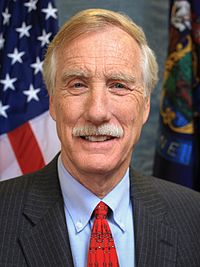
2 historic broadband investments will be transformational for Maine
By U.S. Sen. Angus King, I-Maine
When I ran for Senate in 2012, the very first opinion column I wrote was about the need to expand broadband access in Maine. At the time, I argued that in the 21st century, “high-speed Internet is the major channel for information and interconnection … just as roads, bridges, canals and electric lines were in the past.” Nearly 10 years and one globe-altering pandemic later, that statement has been proven true beyond my wildest imagination.
Given that, here’s a headline to be truly thankful for this week: 2021 is going to be the year that connecting every American to affordable, high-speed broadband went from an aspiration to a plan.
Today, we all know that an affordable, high-speed broadband connection isn’t a luxury — it’s an absolute necessity for anyone who wants to fully engage in 21st century life. The pandemic didn’t create the digital divide, but it did expose it for all to see. As schools and offices closed, students and workers without reliable internet scrambled to stay on top of their responsibilities, and seniors and vulnerable populations had to find ways to access critical telemedicine appointments.

As co-chair of the bipartisan Senate Broadband Caucus, I’ve been focused on closing the digital divide; in light of the pandemic, the entire country was finally paying attention. Action was more than possible — it was urgent. I’m proud to say that Congress rose to the moment, passing the nation’s two largest-ever investments in broadband infrastructure. As a result, in the years ahead Maine is expected to receive more than $400 million in federal broadband funding.
The process started in the early months of 2021, as I worked alongside a number of my colleagues to include more than $17 billion in broadband funding as part of the American Rescue Plan. The package included $10 billion for broadband deployment and infrastructure, and will provide more than $7 billion to expand educational connectivity and close the “homework gap.”
End result? This legislation will bring nearly $130 million in federal funding to Maine to support broadband deployment. That is a major investment — but it was simply a down payment on the work ahead.
The second part of this effort was finalized last week when President Joe Biden signed the Infrastructure Investment and Jobs Act (IIJA) — otherwise known as the “bipartisan infrastructure bill” — into law. Both Sen. Susan Collins and I worked with our bipartisan colleagues to secure vital provisions to rebuild our roads and bridges, support clean drinking water, and more, but the provisions I’m most excited about are — you guessed it — broadband.
The IIJA provides $65 billion to expand affordable broadband and digital equity across the country. More than $40 billion of that funding is based on the BRIDGE Act, bipartisan legislation I introduced with Democratic Sen. Michael Bennet of Colorado and Republican Sen. Rob Portman of Ohio. These funds will be delivered directly to states so local leaders can make decisions about how to best address connectivity and affordability needs specific to our communities.
This broadband expansion will be a vital boost to Maine’s legacy industries like farmers and the forest products sector optimize their output while also attracting new, high-tech companies to call Maine home.
The benefits will also strengthen communities across our state — particularly rural communities — that have struggled without reliable broadband. If you found your dream home in a fantastic community, but your realtor told you, “Oh, by the way, you’ll never be able to get good WiFi,” would you buy the house? I don’t think so. That’s a real conversation that has driven down home values and spurred a declining population in good communities across Maine; broadband investments change the calculus by creating new jobs and exciting economic opportunities.
When I think of the work we’ve done to expand broadband over the last year, one word comes to mind: transformational. Every generation or so, a new technology comes along that completely redefines how the world operates, and when that happens, the government has a responsibility to ensure that no American is left behind. FDR did it in the 1930s by funding rural electrification to make sure no communities were left in the dark, and Dwight Eisenhower literally created a roadmap for economic opportunity by connecting every corner of the country through the Interstate Highway System.
This is our moment. Over the last year, Congress has invested in bringing the promise of the internet to every corner of our state, so every single Maine person is just a click away from good jobs, a high-quality education, lifesaving medical care, and so much more. We’ve invested in the future of Maine — and built a foundation for success that will endure for generations to come.